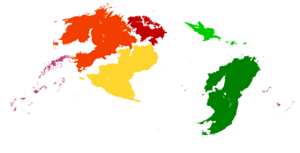Teleon: Difference between revisions
No edit summary |
|||
| Line 8: | Line 8: | ||
| image_alt = | | image_alt = | ||
| caption = The six continents of Teleon. | | caption = The six continents of Teleon. | ||
| apsis = | | apsis = 157,300,000 km | ||
| periheon = 150,920,000 km | |||
| discovery_ref = <!-- <ref>...</ref>--> | | discovery_ref = <!-- <ref>...</ref>--> | ||
| discoverer = | | discoverer = | ||
| Line 19: | Line 20: | ||
| apoastron = | | apoastron = | ||
| semimajor = | | semimajor = | ||
| avg_speed = | | avg_speed = 27.3 km/s | ||
| eccentricity = | | eccentricity = 0.026 | ||
| period = 365. | | period = 365.593 d | ||
| satellite_of = [[Luna (Aurorum)|Luna]] | |||
| synodic_period = <!--(Synodic orbital period)--> | | synodic_period = <!--(Synodic orbital period)--> | ||
| inclination = | | inclination = | ||
| Line 30: | Line 32: | ||
| star = | | star = | ||
| physical_ref = <!-- <ref>...</ref>--> | | physical_ref = <!-- <ref>...</ref>--> | ||
| mean_radius = | | mean_radius = 4,891.1 km | ||
| surface_area = | | surface_area = 296,012,380 km<sup>2</sup> | ||
| volume = | | volume = | ||
| density = | | density = 7.280 g/cm<sup>3</sup> | ||
| mass = 5.972×10<sup>24</sup> kg | | mass = 5.972×10<sup>24</sup> kg | ||
| surface_grav = 9. | | surface_grav = 9.694 m/s<sup>2</sup> | ||
| moment_of_inertia_factor = | | moment_of_inertia_factor = | ||
| escape_velocity = | | escape_velocity = 10.706 km/s | ||
| rotation = 0.9972 d <small>(23h 49m 6.3s)</small> | |||
| axial_tilt = 24.04° | |||
| albedo = | | albedo = | ||
| single_temperature = | | single_temperature = | ||
| atmosphere = yes | |||
| surface_pressure = 100.2834 {{wp|pascal|kPa}} | |||
}} | }} | ||
'''Teleon''', commonly referred to as '''Earth''' or the '''World''', is a {{wp| | '''Teleon''', commonly referred to as '''''Earth''''' or the '''World''', is a {{wp|Terrestrial planet|terrestrial planet}} orbiting the {{wp|Sun}}. It is the fifth-largest and fifth-most-massive object in the Solar System, as well as the only currently known {{wp|astronomical object|celestial object}} in the Solar System and the known {{wp|universe}} to harbor and sustain {{wp|life}}. Additionally, it is the largest and densest of the Solar System's rocky planets. Teleon constitutes a {{wp|binary planet|binary planetary system}} together with its only {{wp|natural satellite}}, the Moon or ''Luna'', that makes up 40% of the binary system's total mass and interacts with the respective other {{wp|gravity|gravitationally}}. | ||
Teleon is unique in that its surface consists partly of {{wp|liquid water}}, both as salt-water and freshwater, making up the {{wp|hydrosphere}}, and an active planetary {{wp|geology}} with mechanically rigid {{wp|tectonic plates}} constituting the {{wp|lithosphere}} above a planetary interior of a solid {{wp|Earth's inner core|inner core}}, fluid {{wp|Earth's outer core|outer core}} and convecting {{wp|mantle (geology)|mantle layer}}, active geothermal activity which produce {{wp|volcano|volcanic activity}}, {{wp|earthquake|earthquakes}} and a stable {{wp|geomagnetic field}}. This allows the planet to have developed a rich {{wp|atmosphere}} consisting mainly of {{wp|nitrogen}}, {{wp|oxygen}} and other gasses, which in turn results in the constitution of the {{wp|water cycle}}, {{wp|greenhouse effect}} and {{wp|weather}} existing as a dynamic system on Teleon. | |||
Various factors such as the aforementioned and particularly Teleon's distance from the Sun allowed for the planet to proliferate {{wp|anaerobic organism|anaerobic}} and later {{wp|aerobic organism|aerobic life}} some 4.1 billion years ago. Since, life has evolved and thrived over long periods of Teleon's history, spawning a plethora of {{wp|biodiversity}} and occassionally punctuated by {{wp|mass extinction|mass extinction events}}. Today, the modern {{wp|human}} (''homo sapiens'') inhabits Teleon and has increasingly altered its {{wp|climate change|climate and atmosphere}}, {{wp|biodiversity loss|biosphere}} and {{wp|land use|surface}} in what is dubbed the "{{wp|anthropocene}}". Having ascended as a global species, it has established various {{wp|society|societies}} of {{wp|ethnic group|ethnicities}}, {{wp|religion|religions}}, {{wp|sovereign state|sovereign states}} and {{wp|ideology|ideologies}}, and made significant progress in culture, arts, sciences, economic prosperity, and quality of life. | |||
==Etymology== | ==Etymology== | ||
Revision as of 08:53, 20 June 2024
This article is incomplete because it is pending further input from participants, or it is a work-in-progress by one author. Please comment on this article's talk page to share your input, comments and questions. Note: To contribute to this article, you may need to seek help from the author(s) of this page. |
 The six continents of Teleon. | |
| Designations | |
|---|---|
| Earth, the World | |
| Orbital characteristics | |
| Eccentricity | 0.026 |
| 365.593 d | |
Average orbital speed | 27.3 km/s |
| Satellite of | Luna |
| Physical characteristics | |
Mean radius | 4,891.1 km |
| 296,012,380 km2 | |
| Mass | 5.972×1024 kg |
Mean density | 7.280 g/cm3 |
| 9.694 m/s2 | |
| 10.706 km/s | |
| 0.9972 d (23h 49m 6.3s) | |
| 24.04° | |
| Atmosphere | |
Surface pressure | 100.2834 kPa |
Teleon, commonly referred to as Earth or the World, is a terrestrial planet orbiting the Sun. It is the fifth-largest and fifth-most-massive object in the Solar System, as well as the only currently known celestial object in the Solar System and the known universe to harbor and sustain life. Additionally, it is the largest and densest of the Solar System's rocky planets. Teleon constitutes a binary planetary system together with its only natural satellite, the Moon or Luna, that makes up 40% of the binary system's total mass and interacts with the respective other gravitationally.
Teleon is unique in that its surface consists partly of liquid water, both as salt-water and freshwater, making up the hydrosphere, and an active planetary geology with mechanically rigid tectonic plates constituting the lithosphere above a planetary interior of a solid inner core, fluid outer core and convecting mantle layer, active geothermal activity which produce volcanic activity, earthquakes and a stable geomagnetic field. This allows the planet to have developed a rich atmosphere consisting mainly of nitrogen, oxygen and other gasses, which in turn results in the constitution of the water cycle, greenhouse effect and weather existing as a dynamic system on Teleon.
Various factors such as the aforementioned and particularly Teleon's distance from the Sun allowed for the planet to proliferate anaerobic and later aerobic life some 4.1 billion years ago. Since, life has evolved and thrived over long periods of Teleon's history, spawning a plethora of biodiversity and occassionally punctuated by mass extinction events. Today, the modern human (homo sapiens) inhabits Teleon and has increasingly altered its climate and atmosphere, biosphere and surface in what is dubbed the "anthropocene". Having ascended as a global species, it has established various societies of ethnicities, religions, sovereign states and ideologies, and made significant progress in culture, arts, sciences, economic prosperity, and quality of life.
Etymology
Geophysical characteristics
Orbit and rotation
Atmosphere
Hydrology
Satellites
Human geography
| Flag | Sovereign state | Capital city | Population (2021) |
Area | Population density |
Continent | Head of state | Head of government | nominal GDP | Form of government |
|---|---|---|---|---|---|---|---|---|---|---|

|
Dahemia | Gonece | 2,183,805 | 2,599.3 km2 (1,003.6 sq mi) |
840/km2 (2,175.9/sq mi) |
Calesia | Minister-President Ulrich Barschel | $148.3 billion | Constitutional republic | |
| Falland | Sydenham | 84,372,472 | 415,116 km2 (160,277 sq mi) |
211.14/km2 (546.9/sq mi) |
Calesia | Monarch Theresa | Prime Minister Karren Shroff | $3,504.0 billion | Constitutional monarchy | |

|
Free States | Saint Leon | 44,823,900 | TBD km2 (TBD sq mi) |
TBD/km2 (TBD/sq mi) |
Elia Borealis | Supreme Executive Council of the Union of Elian Free States | $310.0 billion | Directorial republic | |
| Nadauro | Itabira | 139,411,400 | 1,298,032 km2 (501,173 sq mi) |
107.4/km2 (278.2/sq mi) |
Elia Austral | President Nataniel Magalhães | $1,391.6 billion | Presidential republic | ||

|
Razan | Sekizbulut | 160,221,093 | TBD km2 (TBD sq mi) |
TBD/km2 (TBD/sq mi) |
Abaria | TBD | TBD | $1,920.0 billion | Parliamentary republic |

|
Waldrich | Alsvik | 62,775,800 | 631,214 km2 (234,713 sq mi) |
99.5/km2 (257.6/sq mi) |
Calesia | Foresitter Mats II | Lawspeaker Anders Kjeldsen | $2,837.0 billion | Constitutional monarchy |
| Yingok | Dongsing | 652,421,000 | 8,037,614 km2 (3,103,340 sq mi) |
81.17/km2 (210.2/sq mi) |
Abaria | President Yeung Kapkaa | $9,122.0 billion | Constitutional republic | ||
